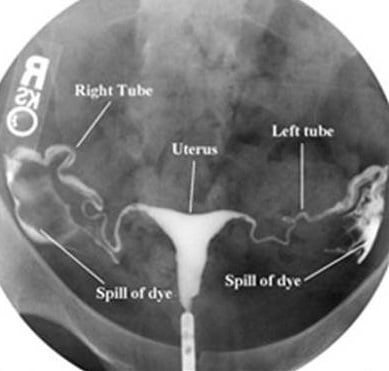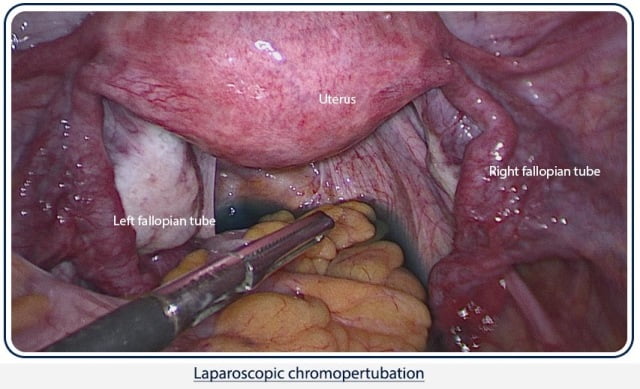Need Help?
We are here to help.
We care for each one who come to us with hope in their hearts.

Fallopian tubes are female reproductive organs that connect the ovaries and the uterus. Every month during ovulation, which occurs roughly in the middle of a menstrual cycle, the fallopian tubes carry an egg from an ovary to the uterus. If an egg is fertilized by sperm, it moves through the tube to the uterus for implantation.If a fallopian tube is blocked, the passage for sperm to get to the eggs, as well as the path back to the uterus for the fertilized egg, is blocked.
Blocked fallopian tubes are a common cause of infertility. Sperm and an egg meet in the fallopian tube for fertilization. A blocked tube can prevent them from joining.
If both tubes are fully blocked, pregnancy without treatment will be impossible. If the fallopian tubes are partially blocked, you can potentially get pregnant.
If only one fallopian tube is blocked, the blockage most likely won’t affect fertility because an egg can still travel through the unaffected fallopian tube. Fertility drugs can help increase your chance of ovulating on the open side.
Fallopian tubes are usually blocked by scar tissue or pelvic adhesions. These can be caused by many factors, including:
Hysterosalpingography, is a radiologic procedure to investigate the shape of the uterine cavity and the shape and patency of the fallopian tubes. It is a special x-ray using dye to look at the womb and Fallopian tubes.

Laparoscopy and chromotubation is a surgery performed for diagnostic or therapeutic purposes in women with infertility, chromopertubation (instillation of dye through the fallopian tubes) is often performed to assess tubal patency. Spillage of the dye from each tube is noted as a confirmation of tubal patency.

| Hysterosalpingography | Laparoscopy |
· Less expensive · No need of GA · Painful · Errors in Reporting · Screening Test · Only Tubal Flushing · Cannot treat any other pathologies | • Expensive • Invasive • General Anesthesia • Accurate • Gold Standard • Corrective Procedures • Useful for PCOS, Endometriosis etc |
If the fallopian tubes are blocked by small amounts of scar tissue or adhesions, a laparoscopic surgery can be done to remove the blockage and open the tubes.
Medical treatment like anti tubercular treatment and pelvic inflammatory disease may also be useful.
If the fallopian tubes are blocked by large amounts of scar tissue or adhesions, treatment to remove the blockages may not be possible.
Surgery to repair tubes damaged by ectopic pregnancy or infection may be an option. If a blockage is caused because part of the fallopian tube is damaged, a surgeon can remove the damaged part and connect the two healthy parts.
The chances for pregnancy will depend on the treatment method and severity of the block.
A successful pregnancy is more likely when the blockage is near the uterus(cornual end). Success rates are lower if the blockage is at the end of the fallopian tube near the ovary.
The most common complication of blocked fallopian tubes and treatment is ectopic pregnancy. If a fallopian tube is partially blocked, an egg may be able to be fertilized, but it may get stuck in the tube. This results in an ectopic pregnancy, which can be a medical and surgical emergency.
Surgery that removes part of the fallopian tube also increases the risk of ectopic pregnancy. Because of these risks, doctors often recommend IVF instead of surgery for women with blocked fallopian tubes who are otherwise healthy.
| IVF | Tubal Surgery |
• Expensive • Many times • More Successful • Less chances of Ectopic • More appropriate in cases of advanced age and male factor | • Less Expensive • One time • Only Successful in few cases • More chances of Ectopic • More appropriate in younger women with no other associated factor |
In conclusion,tubal tests are an important part of evaluation of infertility. Not all tests have same amount of accuracy. Laparoscopy is invasive but gold standard and also be corrective at times. In many cases, laparoscopic surgery can repair the blockage and improve fertility. If surgery isn’t successful, IVF can help you conceive. IVF is also appropriate in cases of advanced age and male factor.
We care for each one who come to us with hope in their hearts.

Disclaimer – Dr Kaberi is not associated with any Hosptial/Clinic other than “Advanced Fertility and Gyne Center (AFGC)”. AFGC has only four centers at present 1. “Lajpat Nagar” 2. “CR Park Delhi” 3. “Noida” 4. “Gurgaon“.